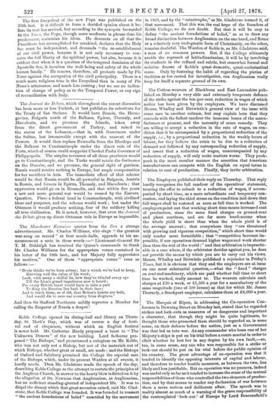The Employers published their reply on Thursday. That reply hardly
recognises the full candour of the operatives' statement, treating the offer to submit to a reduction of wages, if accom- panied by short time, as a mere subordinate and temporary con- cession, and laying the chief stress on the condition laid down that full wages shall be restored as soon as full time is worked. The employers point out that working short time means increased cost of production, since the same fixed charges on ground-rent and plant continue, and are far more burdensome when the whole yield is short than when the whole yield is of the average amount ; that everywhere they " are threatened with growing and vigorous competition," which short time would only render more formidable ; that " competition becomes im- possible, if our operatives demand higher wages and work shorter time than the rest of the world ;" and that arbitration is impractic- able in a case where, if the arbitrator decides against you, he does not provide the means by which you are to carry out his views. Messrs. Whalley and Birtwistle published a rejoinder in Friday's Times, but it is obvious that they and the employers are at issue on one most substantial question,—what the " fixed " charges on rent and machinery, which are paid whether full time or short time be worked, really amount to. The weavers calculate such charges at £30 a week, or £1,560 a year for a manufactory of the same magnitude (one of 500 looms) as that for which Mr. James Thornely, a Stockport employer, calculates them at £6,000 a year.


































 Previous page
Previous page